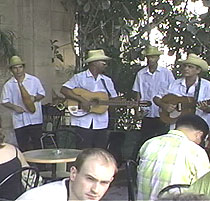2007年VOA标准英语-Cuba's Economy Is Recovering, But Hardships Rem
时间:2018-12-08 作者:英语课 分类:2007年VOA标准英语(一月)
By Bill Rodgers
Washington, DC
31 January 2007
watch Cuba's Economy report
The fate of Cuba's ailing 1 leader, Fidel Castro, has focused renewed attention on his communist nation and generated speculation 2 about the Caribbean island's political and economic future. Cuba's economy -- now largely dependent on tourism and subsidies 3 from Venezuela -- grew by eight percent in 2005, according to independent estimates, and continued expanding in 2006. This growth comes after years of stagnation 4 following the collapse 5 of the Soviet 6 Union, Cuba's patron, in the early 1990s. VOA's Bill Rodgers reports.

Musicians entertaining visitors to Havana
Tourism is now the mainstay of the Cuban economy. The island's natural beauty, its Afro-Caribbean culture, and historic sites attract hundreds of thousands of foreign visitors each year.
Tourism has replaced sugar as the communist nation's top earner of foreign exchange. The sugar industry -- despite production drives that began in the 1960s -- has fallen victim to communism's inefficiencies.
Fidel Castro implanted communism in Cuba with the support of the former Soviet Union shortly after he came to power in 1959. Once heavily subsidized by Moscow, the Cuban economy is only now recovering from the collapse of the Soviet Union in 1991, thanks in large part to financial support from leftist Venezuelan President Hugo Chavez who has forged close ties with Mr. Castro.
But Cuba expert Wayne Smith, of the Center for International Policy, says Venezuela's help is just one factor contributing to the current expansion of the Cuban economy. "It is not simply that they get cheap Venezuelan oil. They have something like 14,000 Cuban medical personnel in Venezuela, for which they are paid handsomely. And they have a new relationship with China. They have a new oil field, it hasn't come in yet, but there are other countries already bidding for drilling rights. And the price of nickel, which is Cuba's leading export, is at an all-time high so everything is going in their favor."
But not well enough for most Cubans, who can only find ample supplies in hard-currency stores and can only buy them if they have access to foreign currency. So while economic growth is up, Ian Vasquez of Washington's Cato Institute says most Cubans are not benefiting. "The ration 7 cards only last several days a month. There aren't the products that most Cubans used to be accustomed to during the time of the Cold War, and so very basic needs, including basic health needs, are not being adequately provided by the state because the state has not had the money to provide it."
For years, Mr. Castro blamed the U.S. economic embargo 8 for his country's economic troubles, but most experts say the fault lies in the communist system.
Despite the embargo, Cuba in recent years has been allowed to buy food from the United States on a cash-only basis. And European and other foreign companies have ignored the U.S. sanctions by investing in Cuba, primarily in the tourism industry.
Cuba's military, led by Fidel's brother, Raul, is involved in tourism and other businesses -- a trend that could accelerate after the elder Castro leaves the scene, according to Wayne Smith: "The Cuban armed forces have been deeply involved in the economy and especially in the tourism industry, in which they've shown themselves excellent businessmen [and] made great profits. I would expect that the armed forces will continue that role, and that the kind of situation they will encourage will be one with greater and greater reforms."
As Fidel Castro's designated successor, speculation has centered on what defense 9 chief Raul Castro might do in a post-Fidel era. Raul is said to admire China and its economic reforms. But such a policy also poses risks, says Cato's Ian Vasquez. “The more that an economy is liberalized, the more that people become independent from the state. So they have a classic dilemma 10. They either continue with liberalization and lose political control, or they crack down and risk instability, political instability. And I think that's the way Cuba is headed under Raul Castro."
But for now, these scenarios 11 are in the future as Cubans try to make ends meet while they wait to see what happens to their long-time ruler.
- They discussed the problems ailing the steel industry. 他们讨论了困扰钢铁工业的问题。
- She looked after her ailing father. 她照顾有病的父亲。
- Her mind is occupied with speculation.她的头脑忙于思考。
- There is widespread speculation that he is going to resign.人们普遍推测他要辞职。
- European agriculture ministers failed to break the deadlock over farm subsidies. 欧洲各国农业部长在农业补贴问题上未能打破僵局。
- Agricultural subsidies absorb about half the EU's income. 农业补贴占去了欧盟收入的大约一半。 来自《简明英汉词典》
- Poor economic policies led to a long period of stagnation and decline. 糟糕的经济政策道致了长时间的经济萧条和下滑。
- Motion is absolute while stagnation is relative. 运动是绝对的,而静止是相对的。
- The country's economy is on the verge of collapse.国家的经济已到了崩溃的边缘。
- The engineer made a complete diagnosis of the bridge's collapse.工程师对桥的倒塌做了一次彻底的调查分析。
- Zhukov was a marshal of the former Soviet Union.朱可夫是前苏联的一位元帅。
- Germany began to attack the Soviet Union in 1941.德国在1941年开始进攻苏联。
- The country cut the bread ration last year.那个国家去年削减面包配给量。
- We have to ration the water.我们必须限量用水。
- This country put an oil embargo on an enemy country.该国对敌国实行石油禁运。
- During the war,they laid an embargo on commerce with enemy countries.在战争期间,他们禁止与敌国通商。
- The accused has the right to defense.被告人有权获得辩护。
- The war has impacted the area with military and defense workers.战争使那个地区挤满了军队和防御工程人员。
- I am on the horns of a dilemma about the matter.这件事使我进退两难。
- He was thrown into a dilemma.他陷入困境。
- Further, graphite cores may be safer than non-graphite cores under some accident scenarios. 再者,根据一些事故解说,石墨堆芯可比非石墨堆芯更安全一些。 来自英汉非文学 - 环境法 - 环境法
- Again, scenarios should make it clear which modes are acceptable to users in various contexts. 同样,我们可以运用场景剧本来搞清楚在不同情境下哪些模式可被用户接受。 来自About Face 3交互设计精髓